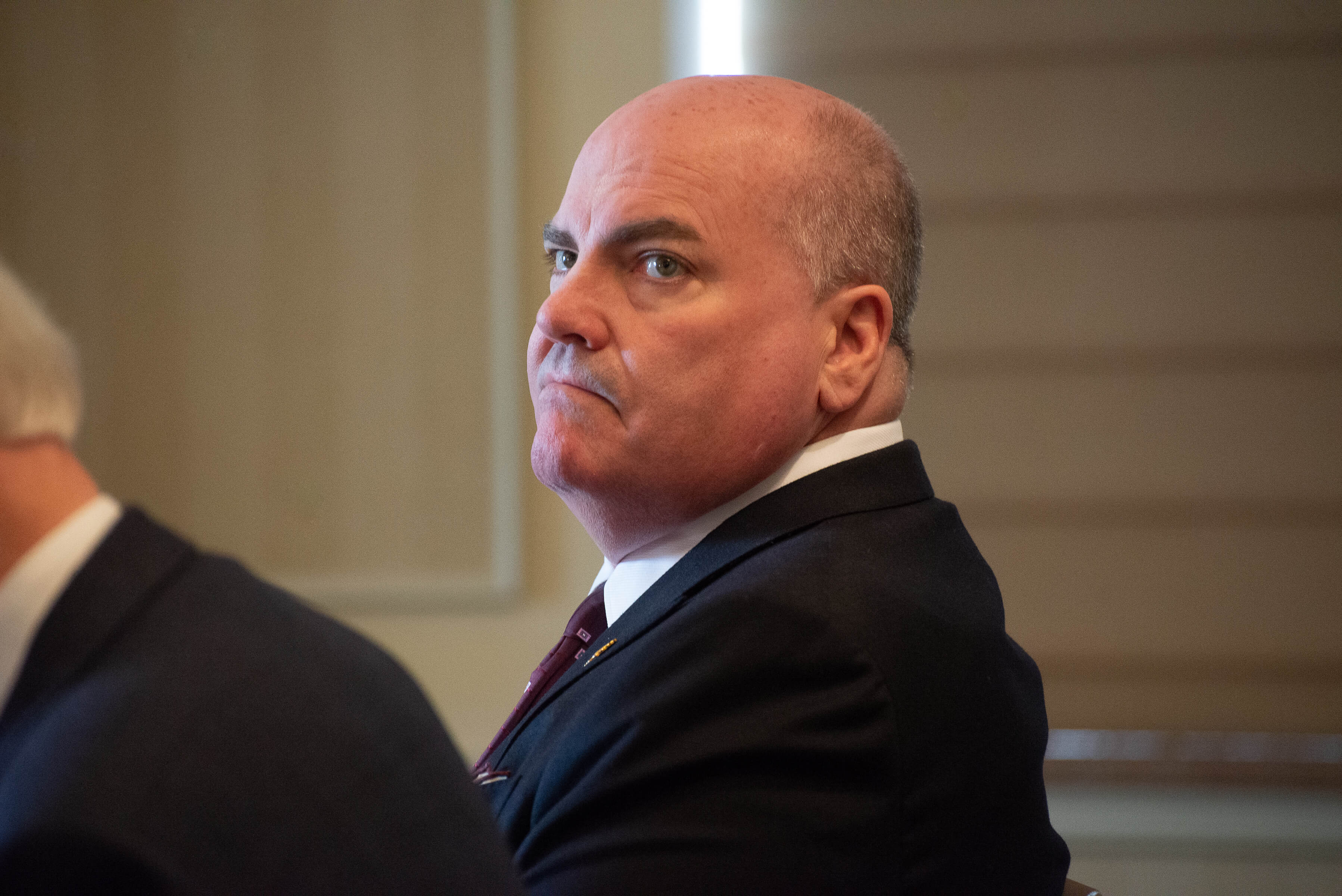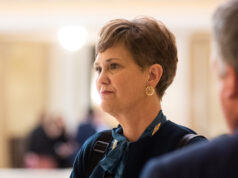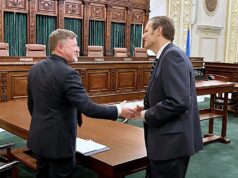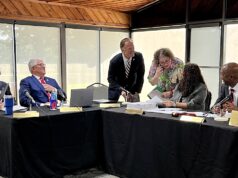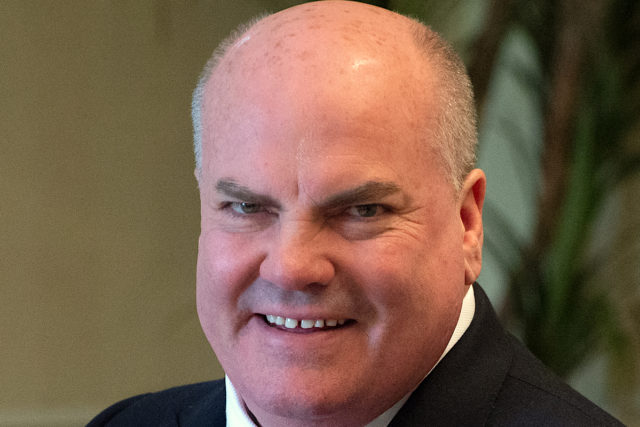

Phil Albert, the former manufacturing executive who served six years on the University of Oklahoma Board of Regents before resigning in January, “engaged in a scheme and artifice to defraud Pelco Structural and its owners by embezzling” at least $1.5 million between 2016 and 2019, according to a former Pelco accountant’s sworn plea agreement filed in federal court last week.
While he was president and managing member at Pelco Structural, Albert would “write on a scrap piece of paper whatever amount he wanted me to submit as a special reimbursement for him” through the Claremore-based company’s payroll system, swore Don Eagleton Jr., a former Pelco accountant and controller.
“At Albert’s direction, these reimbursement payments were structured so that they would neither have federal income taxes withheld, nor appear on Albert’s Form W-2,” Eagleton wrote. “At Albert’s direction, I affirmatively concealed the unauthorized payments by falsely miscoding the payments in Pelco Structural’s accounting system so that they would appear within the Cost of Sales-Steel account.”
Albert resigned from Pelco Structural in April 2019, ultimately filing a preemptive lawsuit against the company he co-founded with Phil Parduhn in 2005. Parduhn’s sons countersued, alleging Albert had embezzled at least $7.4 million. Federal investigators visited and interviewed longtime Pelco Structural employees in February, NonDoc has learned.
RELATED
As embezzlement allegation looms, Phil Albert resigns from OU Board of Regents by Tres Savage
Appointed to the OU Board of Regents in 2016 by then-Gov. Mary Fallin, Albert served for a period on the board’s finance committee and stood in line to become chairman for the seventh and final year of his term. Instead, he resigned in January after declining to comment on the allegations against him for two years.
When Albert stepped down from OU’s governing board, Gov. Kevin Stitt and OU President Joe Harroz offered praise for his tenure.
“Phil Albert served the University of Oklahoma well during his time as a regent,” Stitt said in a press release from his office.
Harroz offered a quote in the same release.
“As a regent, he has demonstrated an ardent passion for our university and our students, and we sincerely appreciate his counsel these past six years,” Harroz said.
Asked for comment about Eagleton’s plea agreement and the allegations against Albert, an OU spokeswoman said university officials have no additional comments at this time.
Federal prosecutors filed their case against Eagleton on Aug. 9, and he pleaded guilty to misprison of a felony — meaning he helped conceal and did not report a criminal act — on Sept. 14.
Asked about the situation Monday, members of the Parduhn family declined to comment on the ongoing criminal investigation.
Allegation aligns with Phil Albert’s time as leading political donor
During the 2016 to 2019 timeframe outlined in Eagleton’s embezzlement allegation, Albert stood as one of Oklahoma’s most prominent political donors. From 2014 to 2018, Albert handed out more than $105,000 to state candidates and committees. He donated about $90,000 more to congressional and U.S. Senate candidates over the same time, Federal Election Commission records show.
If U.S. Attorney Clinton Johnson of the Northern District of Oklahoma ultimately charges Albert, it would become the second active prosecution of major political donors in the state. In June, Oklahoma County District Attorney David Prater filed embezzlement and racketeering charges against former Epic Charter School leaders Ben Harris and David Chaney, who each donated more than $100,000 to state campaigns between 2015 and 2021.
Those figures ranked Harris and Chaney among the top individual political donors in Oklahoma, as did Albert’s largesse.
Albert’s political donations went mostly to Republicans, but he contributed to the campaigns of some Democrats as well. During the crowded 2018 race for governor of Oklahoma, Albert donated to Stitt, Todd Lamb, Mick Cornett, Gary Jones and Scott Inman. Also in 2018, Albert donated to Joy Hofmeister for her state superintendent reelection effort, and he donated to both leading candidates for attorney general: Mike Hunter and Gentner Drummond. (Hunter resigned suddenly in May 2021, and Drummond won the 2022 Republican primary for attorney general to face Libertarian Lynda Steele in November.)
Read Don Eagleton’s full confession from his plea agreement
I, Donald E. Eagleton, Jr., admit that I was formerly employed at Pelco Structural from approximately 2008 until April 2019, where I originally held the position of Accountant, and later the title of controller. Pelco Structural was a single-member Oklahoma limited liability company owned by Par 5 Products, Inc. I worked at the Pelco Structural offices in Claremore, Oklahoma, which is within the northern district of Oklahoma.
My job responsibilities at Pelco structural included managing payroll, accounts receivable, accounts payable, financial statements, and the general ledger. During my employment with Pelco Structural, I reported directly to, and worked under the supervision of, Philip Albert, the president and managing member of Pelco Structural. Pelco Structural utilized the accounting MA290/Sage for its financial management and reporting, and payroll data was transmitted by me to Pelco Structural’s outside payroll service company, Paychex, which maintains its offices and servers in Rochester, New York.
Between approximately 2016 until my departure from Pelco Structural in 2019, I became aware that Albert was engaged in a scheme and artifice to defraud Pelco Structural and its owners by embezzling money from the company. Specifically, Albert directed me to utilize Paychex to set up a special category of “reimbursement” payments for Albert. At Albert’s direction, these reimbursement payments were structured so that they would neither have federal income taxes withheld, nor appear on Albert’s form W-2. Albert directed me to have the reimbursement payment mailed to him at Pelco Structural’s office in the form of a physical check, rather than by direct deposit, which was the normal method by which Albert received payments from the company. Each time a reimbursement check was processed, interstate wires were transmitted from Pelco Structural’s offices in the northern district of Oklahoma and Paychex facilities in New York. From approximately 2016 through 2019, Albert received 29 such reimbursement checks totaling $1,543,000, which were deposited into Albert’s personal checking account at BancFirst bank in Claremore, Oklahoma. Albert did not submit receipts or any documentation to support the alleged reimbursements but would instead write on a scrap piece of paper whatever amount he wanted me to submit as a special reimbursement for him. Despite my knowledge of Albert’s scheme, I never notified any law-enforcement authority or any judge or other federal civil or military authority, such as a federal grand jury, Secret Service or FBI agent. Instead, at Albert’s direction, I affirmatively concealed the unauthorized payments by falsely miscoding the payments in Pelco Structural’s accounting system so that they would appear within the Cost of Sales-Steel account, thus canceling their true nature and misrepresenting the company’s financial statements to the owners and other stakeholders.









